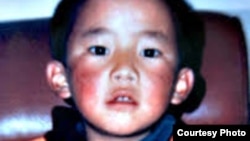It’s been 27 years since authorities of the People’s Republic of China (PRC) abducted a six-year-old Tibetan boy and his family. Three days before he disappeared in May 1995, the Dalai Lama, Tibetan Buddhists’ spiritual leader, designated Gedhun Choekyi Nyima as the 11th Panchen Lama, the second most revered figure in Tibetan Buddhism. After his abduction, the PRC selected another boy to be a more politically satisfactory Panchen Lama.
At six years old, Gedhun Cheokyi Nyima was called the youngest political prisoner in the world. Neither he nor his family has been seen in public since their abduction, and their whereabouts are unknown.
On the occasion of his 33rd birthday on April 25, the United States called on PRC authorities to immediately account for Gedhun Cheokyi Nyima’s whereabouts and well-being. In a statement, Ned Price, State Department Spokesperson, said the Panchen Lama must be allowed “to fully exercise his human rights and fundamental freedoms.”
Tragically, many Tibetans are barred from exercising their human rights and fundamental freedoms under the rule of the Chinese Communist Party. The State Department’s most recent human rights report on China notes, “Outside observers examined publicly available information and, as of late May, identified between 500 and 2,000 Tibetans known or believed to be detained or imprisoned by PRC authorities in violation of international human rights standards.” The State Department also noted, “In accordance with government guidance on ethnic assimilation, [PRC] state policies continued to disrupt traditional Tibetan culture, living patterns, and customs.”
As State Department Spokesperson Ned Price stated, “The United States supports Tibetans’ religious freedom and their unique religious, cultural, and linguistic identity, including Tibetans’ right to select, educate, and venerate their own leaders, like the Dalai Lama and the Panchen Lama, according to their own beliefs and without government interference.”






